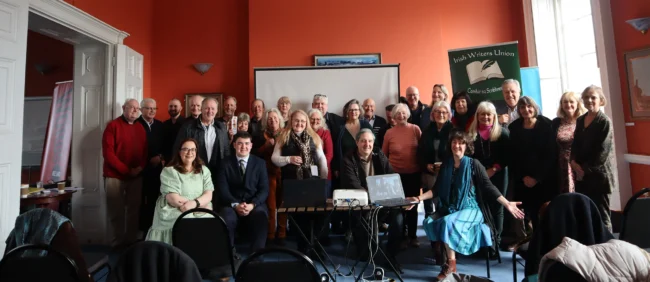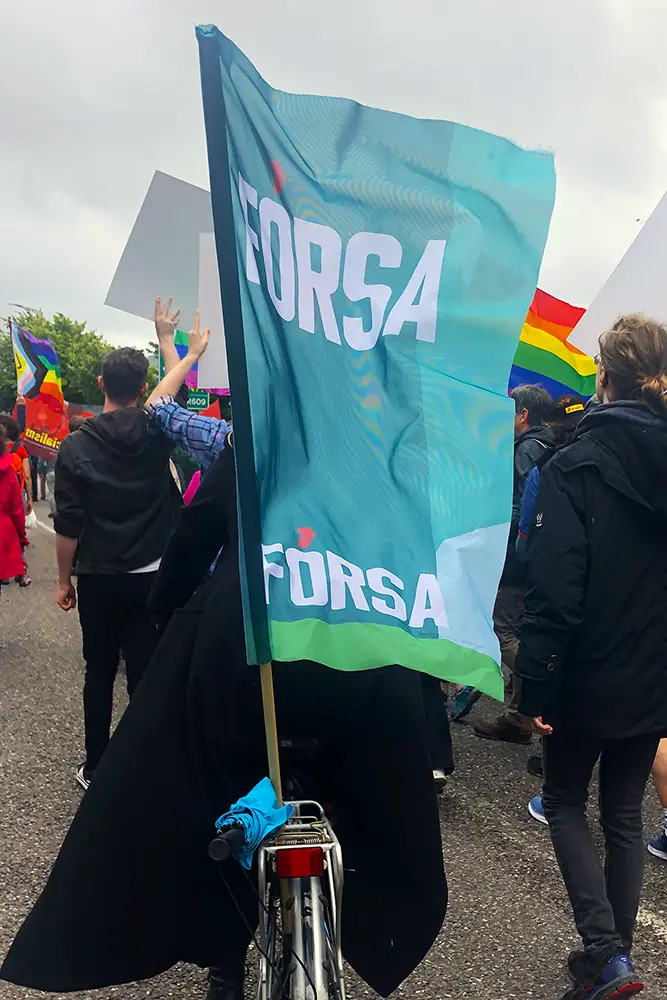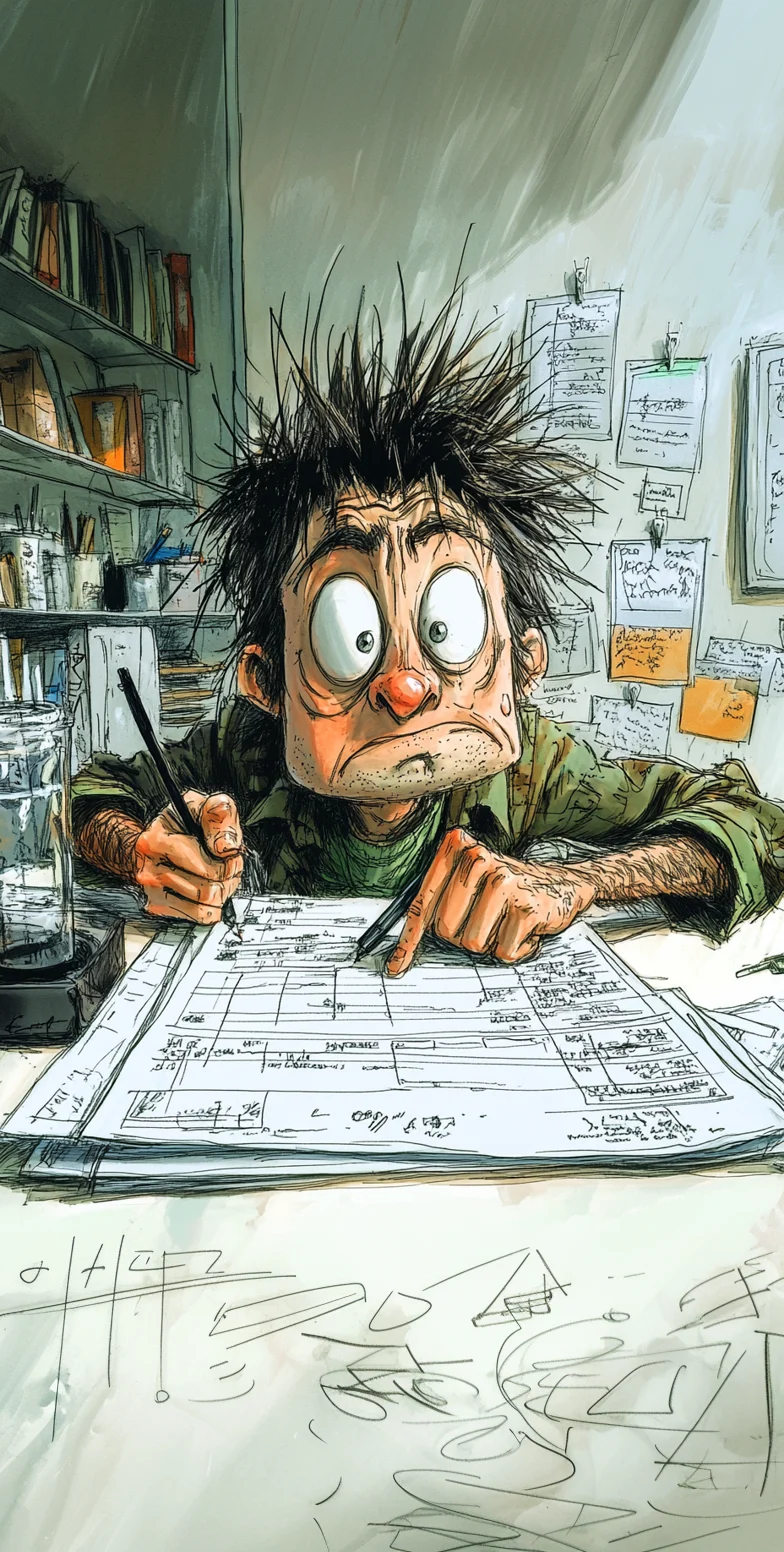Lindsay J Sedgwick, Chair, on behalf of the Executive Committee
The Irish Writers Union stands with the Writers Guild of Ireland (WGI)* in solidarity and support of the Writers Guild of America (WGA) who went on strike on 2 May 2023.
This strike – the first since 2007-8 – follows the breakdown in talks between the WGA – who represent 11,500 writers, and the Alliance of Motion Picture and Television Producers (AMPTP). The AMPTP represents more than 350 film and television companies. These include film studios such as Paramount Pictures, Sony Pictures, Universal Pictures, Walt Disney Studios and Warner Bros; streamers Netflix, Apple TV+ and Amazon Prime, and US networks such as ABC, CBS, Fox and NBC.
The contract between the WGA and AMPTP is renegotiated every three years and the current one expired on 1 May 2023.
Issues Behind the Writers Guild of America Strike
Issues behind the strike include writers’ residuals and the use of artificial intelligence as a source material in screenwriting. Residuals are like royalties: the more successful a show, the more income is generated for the screenwriter. While broadcast television uses a “reward-for-success” model, which means that writers can earn more in residuals if a show is a hit, writers for streamed shows are paid a set amount regardless of the success of the show.
Because of this, the WGA is arguing that seasoned writers are not being recognised with the wages they deserve, and that wages are stagnating.
In addition, studios and streamers have been ordering shorter seasons, dropping old shows and introducing mini-writing rooms to develop shows rather than commissioning pilots, all of which impact significantly on a screenwriter’s potential income.
As for AI, the WGA is looking for regulation on its use in scriptwriting and asking the AMPTP to guarantee that it won’t be “used as source material”.
“What’s happening in the US now in terms of how writers get treated will have an impact in the rest of the world,” says Jennifer Davidson, Chair of the WGI. “We all know here the reality of writers being expected to do unpaid development work and how that directly impacts the diversity of writers in our industry, excluding those who can’t afford to work for free.”
The Board of the WGI has expressed a motion of solidarity with the WGA and is advising their members not to work on projects within the jurisdiction of the WGA for the duration of the strike. “It’s so important to be able to collectively stand together for our rights,” said Davidson.
The writers’ strike of 2007-8 lasted 100 days. Issues they were fighting then included better residuals from DVD sales and compensation for material being broadcast online. (This author still has the t-shirt from the march in solidarity organised by WGI.)
The strike ended with a new contract that guaranteed writers a stake in revenue generated when their creative material was distributed on the internet.
According to the Guardian newspaper, 97.85% of WGA members voted in mid-April in favour of a strike if their terms were not met. Negotiations began on 20 March and ended without agreement.
But striking is a last resort.
For WGA members, it means they do not write, revise, pitch or negotiate with any of AMPTP members.
The WGI is advising its members not to work on projects within the jurisdiction of the WGA for the duration of the strike With US writers on strike, it is more than likely that US companies will look further afield. “This is going to seem flattering,” says Davidson, “and potentially an opportunity to break into the US market, but doing so would mean that you’re breaking the strike and this could have real implications for your career, not least that you’ll be barred from working in the US as soon as the strike is over.”
The IWU Urges Solidarity with the Writers Guild of America
The IWU also urges its members not to take on any work that would violate the strike.
There will be a Day of Solidarity, fully supported by the IWU, in which writers here can turn out in support of their American colleagues. A date is yet to be confirmed.
Meanwhile, the IWU wish our American writer colleagues the best, we hope that the strike is short and ends with a fairer contract.
Know More About the Writers Guild of America Strike
By IWU Executive Committee member Lenore Hart, based in the US
The WGA represents over 11,000 writers in the United States, while the Alliance of Motion Picture and Television Producers (AMPTP) represents the major Hollywood studios, including Disney, Warner Bros., Sony, and Universal. The two sides have been negotiating for over a year, but have been unable to reach an agreement. At this point the strike is having a significant effect on the television and film industry in the US, and it’s unclear how long it might last, or what the ultimate outcome will be.
What are the issues at stake? Hollywood writers are angry for many reasons. They believe they aren’t being compensated fairly for their work, Streaming platforms like Netflix and Hulu have become increasingly popular over the past ten years or so, but the writers of creative content for those shows haven’t received any corresponding increase in compensation for their work on these platforms. Also, they have seen staffing decreases at the same time.
They’re also concerned about health-care benefits, The AMPTP has proposed some very unpopular changes to WGA writers’insurance plans that would make it more expensive for those writers and their families to receive the same level of care. They’re also frustrated with the lack of transparency in the negotiation process. The AMPTP has refused to share information about its financial situation with the WGA, which makes it difficult for writers and their representatives to assess the studios’ true ability to pay.
So, the WGA officially went on strike on 2 May 2023 after failing to reach a new contract agreement with the AMPTP. This strike is the first major labor disruption in Hollywood since the lengthyone that occurred from 2007-2008.The WGA seeks a number of changes to its contract with the AMPTP, including increased compensation for their work on streaming platforms; improved health care benefits; and greater transparency in the compensation and benefits negotiation process.
The AMPTP says it’s willing to negotiate on some of those demands, but refuses to make any concessions on others. The two sides are scheduled to meet again on 10 May 2023, but it’s unclear whether they will be able to reach an agreement before the strike enters its second week. It’s already having a significant impact on American’s television and film industry. Production on many TV shows and streaming series has been halted. Networks are scrambling to find various kinds of replacement programming, often resorting to reruns. The strike is also expected to have a negative impact on box office proceeds, as many films are delayed or even cancelled.
The strike is a serious setback for Hollywood’s major industry, and it’s unclear how long it may last, or what the ultimate outcome will be. One thing that it has made clear, though – again – is the importance and power of labor unions, and of fair compensation for all workers, everywhere – including those in the creative arts.
Read also an interview with writer Eliza Clark on the WGA, the strike, unionising and the long road ahead.
The WGI represents over 600 Irish writers for film, television, theatre, radio, animation and games. It was founded as the Society of Irish Playwrights (SIP) in 1969 and became the Irish Playwrights and Screenwriters Guild (IPSG) in 2001 and then the Writers Guild of Ireland in 2012. The WGI is a founder member of the Federation of Screenwriters in Europe (FSE) and a member of the International Affiliation of Writers Guilds (IAWG). It has a joint membership agreement with the Writers Guild of Great Britain and an agreement with the Authors Licensing and Collecting Society. The WGI campaigns to ensure writers are recognized as the creative force without which there is no production.
The IWU represents authors in the publishing industry. Because there is often an overlap between writing for screen and publishing, both organisations have a mutual support agreement and are in full solidarity with one another.











